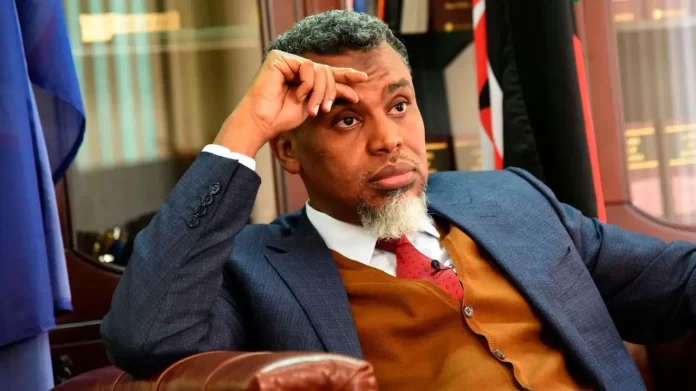The National Intelligence Service (NIS) Director General, Noordin Haji has been criticized by Kenya Kwanza politicians of conniving with opposition leader Raila Odinga and former President Uhuru Kenyatta by potentially being their mole in government.
According to Kenya Kwanza MPs, General Philip Kameru’s term as head of the spy service ended on June 14, 2023, and on that day, General Noordin took over.
During their latest meeting at State House in Nairobi, the Kenya Kwanza MPs said that Haji is spying for the opposition, and has been trying to broker a truce between the President and Raila Odinga.
They also claim that Haji has close ties with retired President Uhuru Kenyatta.
The leaders have called for Haji’s dress down in both the National Assembly and the Senate, and some have even called for his removal from office.
Haji, a son of a former Garissa Senator and veteran politician, the late Yussuf Haji, finished his tenure in the Office of the Director of Public Prosecutions (ODPP) which he had occupied for five years after taking it in 2018, having succeeded Keriako Tobiko.
Miguna Miguna, the Lawyer has applied for the position of Director of Public Prosecutions, stating that he is in the race to succeed Haji. He has applied for the position and must appear before the National Assembly for approval before being sworn into office.
In a statement he shared online on Monday, July 10, 2023, the lawyer stated that he was in the race to take the seat which fell vacant after Haji was appointed to head the National Intelligence Service (NIS).
“For the avoidance of any doubt, yes, I have applied for the position of The Director of Public Prosecutions,” he stated.
The Kenyan Constitution dictates that the qualifications for appointment as DPP are similar to those for a judge of the High Court, such as meeting the requirements of Chapter Six of the Constitution and being of high moral character, integrity, and impartiality.
The DPP is mandated to institute and undertake criminal proceedings against any person before any court, take over and continue any criminal proceedings with the person’s permission, and direct the Inspector-General of the National Police Service to investigate any information or allegation of criminal conduct within their mandate.















